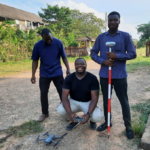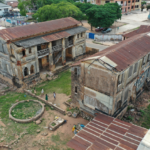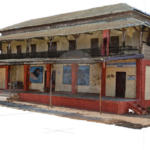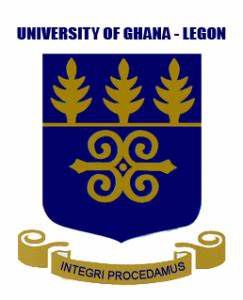


Since 2022, the ‘Volta-German Shared Colonial Heritage Project’, led by Jörg Linstädter, Cornelia Kleinitz and Wazi Apoh, has been dedicated to the colonial-period ‘shared heritage’ of the former German colony of Togo/Togoland in present-day eastern Ghana. The cooperation project builds on extensive multidisciplinary research on the German missionization and colonization of Togoland under the direction of Wazi Apoh and is dedicated to the joint investigation of colonial-period material heritage in today’s Volta Region and neighbouring regions. Ghanaian and German team members contribute expertise from the fields of archaeology, history, ethnography, architecture/building history and surveying/cartography to the project.
The DAI-KAAK contributes to this ‘shared heritage’ project in three ways: Firstly, in the field of building research in cooperation with the Department of Architecture/Historical Building Research at the Ostbayerische Technische Hochschule (OTH) Regensburg; secondly, through GIS applications to investigate colonial spaces in cooperation with the Chair of Christian Archaeology at the Friedrich-Alexander-Universität Erlangen-Nürnberg; and thirdly, through research in various archives and collections, such as the Bundesarchiv, the Staatsbibliothek zu Berlin or the Staatsarchiv Bremen. One of the aims of the project is to document the architectural heritage from the German colonial era on the basis of archival and field work in close coordination and cooperation with the local authorities and communities and to develop ideas and concepts for future-oriented reuse scenarios in discourse with local stakeholders.
In the town of Kpando, current research is focusing on three building complexes that represent key aspects of the colonial system of rule: German administration, local authority and Christian mission. A preliminary investigation and documentation of the buildings in their current condition was carried out in March 2023 in the building complexes of the German colonial administration in Kpando-Todzi as well as the palace of the Paramount Chief and Catholic Mission buildings in the city center, and considerations for their further use were discussed.
The palace complex of the Paramount Chief, for example, may need exhibition spaces in the future. Royal regalia might be returned to its premises and made accessible to the public that were confiscated by German colonial officials in the early 20th century and taken to the Ethnological Museum in Berlin These objects are currently in the process of restitution.
Members

Prof. Dr. Jörg Linstädter
KAAK
joerg.linstaedter@dainst.de

Dr. Cornelia Kleinitz
KAAK
cornelia.kleinitz@dainst.de

Dipl.-Ing. Christian Hartl-Reiter
KAAK
christian.hartl-reiter@dainst.de

Kathrin Loges B.A.
KAAK
kathrin.loges@dainst.de
Cooperation partners
Prof. Dr. Wazi Apoh
University of Ghana, Legon

Ernest K. Fiador, MPhil
University of Ghana, Legon

Prof. Dr. Dietmar Kurapkat
Ostbayerische Technische Hochschule (OTH) Regensburg
Annika Zeitler, M.A.
Ostbayerische Technische Hochschule (OTH) Regensburg
Prof. Dr. Ute Verstegen
Friedrich-Alexander-Universität Erlangen-Nürnberg
Figure captions
Fig. 1 The surveying team at work on the administration building in Kpando-Todzi [Photo: Cornelia Kleinitz, DAI-KAAK]
Fig. 2 Drone photo of the school buildings of the Catholic Mission in Kpando [Photo: Rodney Tagoe, DAI-KAAK]
Fig. 3 3D-visualization of the palace of the Paramount Chief in Kpando [Graphics: Christian Hartl-Reiter, DAI-KAAK]